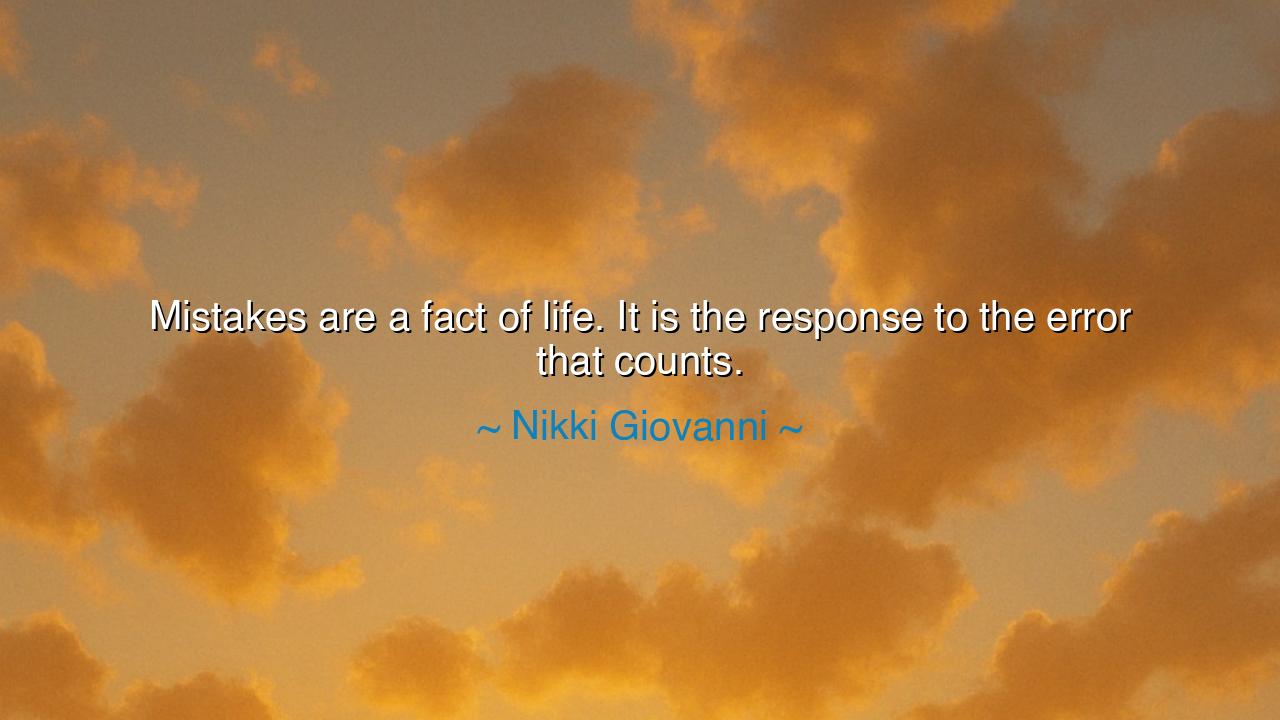
Mistakes are a fact of life. It is the response to the error that






"Mistakes are a fact of life. It is the response to the error that counts." These words, spoken by Nikki Giovanni, offer a timeless truth about the nature of failure and growth. Giovanni reminds us that mistakes, as inevitable as they are, do not define us; it is our response to them that shapes our character and our future. The notion of mistakes being a fact of life is not a condemnation, but a recognition that imperfection is intrinsic to the human experience. It is in the handling of these mistakes—whether with grace, humility, or determination—that we find the true measure of our strength and wisdom.
The ancients were well aware of this idea. Socrates, that great philosopher of ancient Greece, believed that the pursuit of wisdom could only come through a process of continuous learning, often through error and reflection. He famously said, "The only true wisdom is in knowing you know nothing." For Socrates, the process of making mistakes was not something to fear but something to embrace as part of the learning journey. His life was defined not by his perfection, but by his willingness to ask the difficult questions and accept the errors that arose in his search for truth. Every misstep was an opportunity for deeper insight, not a reason for despair. Giovanni’s quote echoes this same philosophy—the true value lies not in avoiding mistakes but in how we respond to them.
Aristotle, too, contributed to this wisdom. He taught that virtue lies in the balance between extremes, and in the same way, failure and success are part of the same continuum. For Aristotle, it was not the fall that defined us, but the rising after the fall. The ability to learn from mistakes and adjust our course is what elevates us to the level of true excellence. In this, we see the ancients’ understanding of failure not as an end, but as a vital part of the process of becoming—a stepping stone on the path to wisdom and growth.
The story of Thomas Edison, the inventor of the light bulb, serves as a powerful example of how to respond to mistakes. Edison famously said, "I have not failed. I've just found 10,000 ways that won't work." Edison’s ability to embrace his mistakes with resilience and optimism is a testament to the idea that failure is not to be feared, but rather understood and overcome. For Edison, each error was not a sign of incompetence but a necessary part of the creative process. His persistence in the face of failure ultimately led to one of the greatest inventions in history, showing us that it is not the mistakes themselves that determine our success, but our ability to persevere and adapt.
Consider also the story of Abraham Lincoln, whose rise to the presidency was marked by a series of personal and political failures. From his early losses in elections to his struggles with personal loss, Lincoln experienced setbacks that could have easily defined him as a failure. Yet, Lincoln’s response to his mistakes—the way he learned from them, grew from them, and persisted—was what ultimately made him one of the greatest presidents in American history. His leadership during the Civil War, his dedication to the abolition of slavery, and his ability to unite a fractured nation all came from his capacity to respond to defeat with resilience and vision. Lincoln’s life teaches us that our mistakes do not have to limit us; they can propel us to greater achievements if we rise above them.
The lesson in Giovanni’s quote is clear: mistakes are not the end of the journey but the beginning of new opportunities for growth. They are the soil in which wisdom is planted, and how we respond to them will determine the course of our lives. Failure does not define us—how we respond to failure defines who we are. Grace, perseverance, and self-reflection are the keys to turning mistakes into stepping stones rather than stumbling blocks. The ability to learn from failure and use it as a catalyst for growth is what separates those who succeed from those who are defeated by their errors.
In our own lives, we must embrace mistakes not as sources of shame or frustration, but as invitations to learn, improve, and become stronger. Each misstep is an opportunity to pause, reflect, and reevaluate our approach, to rise with greater clarity and determination. Let us practice the art of resilience, knowing that failure is not final and that our response to it is what will shape our future. Like Socrates, Edison, and Lincoln, we must remember that the path to wisdom and success is paved with mistakes, and it is our ability to adapt and grow from them that will ultimately define our success.






AAdministratorAdministrator
Welcome, honored guests. Please leave a comment, we will respond soon